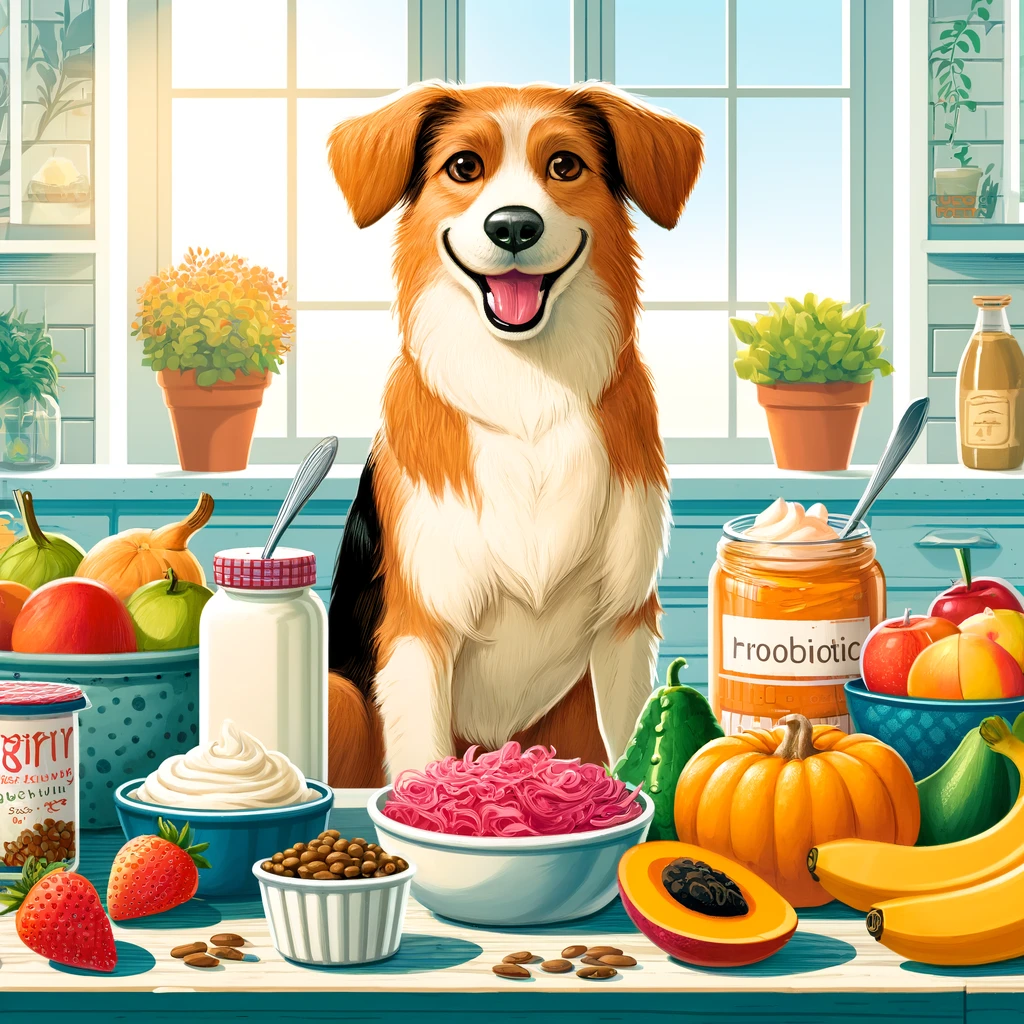Introduction
Probiotics play a crucial role in maintaining your dog’s health by enhancing their digestive system and supporting immune function. Understanding which foods are rich in these beneficial bacteria can help you provide a balanced diet that promotes your pet’s overall well-being. This guide will explore 25 probiotic-rich foods, ensuring you know how to incorporate them safely and effectively into your dog’s routine.
Understanding Probiotics and Canine Health
**What are Probiotics?**
Probiotics are live microorganisms that provide health benefits when consumed in adequate amounts. These benefits are primarily seen in the digestive system, where probiotics help balance the intestinal flora, aiding in digestion and combatting harmful bacteria. For dogs, probiotics can improve gut health, reduce gastrointestinal issues, and boost the immune system.
**Benefits of Probiotics for Dogs**
Integrating probiotics into your dog’s diet can have several positive effects:
– **Enhanced Digestive Health**: Probiotics help maintain a healthy balance of good and bad bacteria in the gut, which is crucial for optimal digestion and nutrient absorption.
– **Immune System Support**: A healthy gut flora is linked to improved immune response, helping your dog resist infections and illnesses.
– **Reduced Gastrointestinal Distress**: Probiotics can help alleviate symptoms of gastrointestinal upset in dogs, including diarrhea, gas, and bloating.
– **Overall Health Improvement**: Regular consumption of probiotics can contribute to your dog’s overall health and vitality, leading to a happier, more active life.
Best Probiotic Foods for Dogs
A variety of foods can serve as excellent sources of probiotics for your pet. Here’s a detailed look at the natural probiotic foods you can consider including in your dog’s diet:
**Natural Probiotic Foods**
1. **Plain Yogurt**: A staple in canine-friendly probiotic foods, plain yogurt is high in live bacterial cultures without the added sugars and artificial flavors found in flavored yogurts.
2. **Kefir**: Similar to yogurt but with a thinner consistency, kefir contains several major strains of friendly bacteria and yeasts, making it a powerful probiotic.
3. **Sauerkraut**: Made from fermented cabbage, sauerkraut is rich in live cultures. Ensure it’s plain and free from spices or additional salt, which can be harmful to dogs.
4. **Miso**: This Japanese seasoning is produced by fermenting soybeans with salt and koji. It can be added in small amounts to your dog’s meals to provide a probiotic boost.
5. **Buttermilk**: The traditional variant of buttermilk (leftover from making butter) contains probiotics. Only use unsweetened and unflavored buttermilk.
Foods Rich in Prebiotics
Probiotics need prebiotics to thrive, making these foods just as important in your dog’s diet. Here are some great prebiotic options:
6. **Bone Broth**: Nutrient-rich and soothing for the gut, ideal for dogs with sensitive stomachs.
7. **Asparagus**: Contains inulin, a prebiotic fiber that supports the growth of beneficial bacteria.
8. **Bananas**: Not only are they a tasty treat for dogs, but they’re also rich in prebiotics.
9. **Garlic**: In very small amounts, garlic can act as a prebiotic. However, large quantities can be toxic, so use sparingly and consult your vet.
10. **Dandelion Greens**: An excellent source of prebiotics, which support the gut flora.
Additional Probiotic Supports
Adding variety to your dog’s diet can help maintain a healthy microbiome. Here are more foods that support probiotic growth:
11. **Jerusalem Artichoke**: High in inulin, enhances the growth of beneficial gut bacteria.
12. **Flaxseeds**: These seeds are not only good for coat health but also provide fiber that helps probiotics flourish.
13. **Pumpkin**: Easy to digest and high in fiber, pumpkin is fantastic for your dog’s gut health.
14. **Oats**: A comforting food that is also a great source of beta-glucans, which nourish probiotics.
15. **Seaweed**: Rich in prebiotic fibers, it helps maintain a healthy gut environment.
Foods to Avoid
While many foods are beneficial, some should be avoided as they can harm your dog:
– **Chocolate**
– **Xylitol**
– **Onions**
– **Grapes and Raisins**
Always consult with your vet before introducing new foods into your dog’s diet, especially if your pet has specific health concerns.
Incorporating Probiotics into Your Dog’s Diet
Introducing probiotics into your dog’s diet should be done gradually.
Start with small quantities to ensure your dog’s digestive system adapts without issues. Monitor your dog’s response and adjust their diet accordingly. Here are some general tips:
– Begin with small amounts of new probiotic-rich foods.
– Watch for any signs of digestive discomfort.
– Consult your veterinarian for guidance on amounts and frequency.
The Importance of Veterinary Guidance
Before making significant changes to your dog’s diet, particularly for pets with existing health issues, consult with a veterinarian. They can provide personalized advice based on your dog’s health profile and nutritional needs.
Conclusion
Enhancing your dog’s diet with probiotic-rich foods can greatly benefit their health, improving digestion and boosting their immune system. By carefully selecting appropriate foods and consulting with your vet, you can ensure that your dog reaps all the benefits probiotics have to offer.
For You to Do…
Explore more about canine nutrition and health by consulting with your vet and considering these beneficial additions to your dog’s diet.


